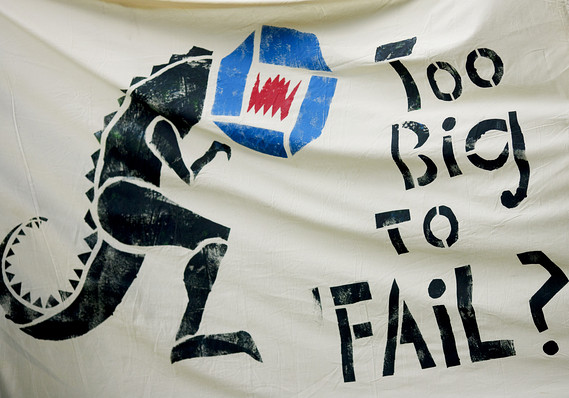By Matthew Dalton
Several euro-zone governments seen missing deficit-cutting targets - IMF
Outlook Deficit forecasts may spark debate over more cuts
EU authorities will decide whether to relax deficit targets
TOKYO
France, Spain and several other euro-zone governments won't hit budget deficit targets agreed with European authorities, the International Monetary Fund said Tuesday, setting the stage for a contentious debate over whether the governments should pursue more cutsor allow the targets to slip
Governments across the European Union have been slashing spending and raising taxes to bring their deficits back in line with the bloc's budget rules, which call for deficits to remain under 3% of gross domestic product
But anemic growth and recession, partly due to previous rounds of austerity, have made the deficit targets difficult to hit and sparked growing political discontent in many of the EU's 27 member states
The IMF said in its semi-annual economic outlook that it expects France's deficit to be 4.7% of GDP this year and 3.5% of GDP at the end of 2013
France has pledged to cut its deficit to 3% of GDP in 2013
The Socialist government of President François Hollande last month unveiled a package of austerity measures, including a 75% tax on incomes over €1 million, to hit the target
Spain's deficit is expected to hit 5.7% of GDP next year, the IMF said, well above the target of 4.5% of GDP
EU authorities and finance ministers earlier this year have already relaxed Spain's target in the face of a recession that has pushed the country's unemployment rate to over 25%
While Italy is seen complying with the 3% budget rule, it too is set to miss its deficit target next year of 0.5% of GDP
The IMF sees Italy's deficit next year at 1.8% of GDP
Pursuing more cuts to hit next year's deficit targets would further roil Europe's political waters and test the powers of these governments to push more austerity through restive national parliaments
The European Commission, the EU's executive arm, is set in the coming weeks to review national austerity programs, making its own determination about whether the programs will hit the budget targets
If the commission believes the numbers don't add up, it will discuss with other EU governments in the coming months whether to seek further cuts or relax the 2013 targets for the governments in question
New rules give the commission the power to fine euro-zone governments that don't comply with its recommendations
Government debt in Greece is accumulating much faster than expected amid the country's sharply deteriorating economic conditions
Total debt now is expected to reach 171% of GDP this year and 182% at the end of 2013, the IMF said
The projections in the IMF's spring outlook were for Greek debt to hit 153% of GDP at the end of this year and 161% next.
"A deeper-than-expected recession and slippages in the implementation of fiscal measures will once again complicate attainment of the ambitious deficit reduction targets," the IMF said.
Officials from the euro zone and the IMF are negotiating whether Greece's debt should be restructured again, this time with the government's official creditors taking losses on their Greek debt holdings
Ireland's deficit, however, is largely on track to meet the terms of its bailout program, according to the IMF's projections
The IMF also repeated its warning that the U.K. should slow the pace of its austerity measures if economic growth falls considerably below forecast in coming months
The fund said weaker growth estimates since its last report in April will likely slow the country's progress in cutting its budget deficit
Its deficit is now forecast to be 8.2% of GDP in 2012 and 7.3% of GDP in 2013; the fund had previously forecast U.K. deficits of 7.9% and 6.7% in 2012 and 2013
The IMF's message is a blow to U.K. Chancellor of the Exchequer George Osborne, who has been one of the leading proponents of austerity and has vowed to stay the course with the government's aggressive spending cuts despite the economy contracting for three consecutive quarters




















6 comentarios:
By MarketWatch
The International Monetary Fund is weighing a number of potential roles to support European nations seeking aid, including new loans from the global lender, a top IMF official said Tuesday.
"We want to muster our resources, both human and financial, to help our member countries," IMF First Deputy Managing Director David Lipton said in an interview. "We're mindful of how difficult the problems are that some of the members face."
The role of the IMF, which serves as the world's emergency lender, remains a key sticking point in talks about new European aid for countries such as Spain and Italy under market pressure.
The European Central Bank, in its latest bid to halt the euro-zone crisis, has offered to unleash its resources to contain borrowing costs for struggling nations in the currency bloc. But those countries first must submit to a rescue program by their European neighbors along with IMF monitoring, which is controversial inside those countries.
Mr. Lipton, who serves as the fund's No. 2 official, said the IMF will help European nations that want its aid. But the structure of that support remains undecided.
"We're open to craft an approach that's appropriate to the circumstances of Europe," he said. "If Europe decides that it wants that IMF involvement in any particular case, we'd try to craft something that was useful."
Among the options: the IMF could simply provide monitoring of a European aid program but no money, drawing on its economists to provide independent evaluations of the aid recipient. It also could provide loans as part of a larger European package, a process that would be closer to its usual lending programs.
Kicking more IMF money into Europe could draw resistance from some of the fund's 188 members who own the institution. The fund has already committed more than $100 billion to loan programs for Greece, Ireland and Portugal, amounting to some of the largest loans in the fund's history.
Some IMF members, such as the U.S. and Canada, have said the rich nations of Europe shouldn't rely on the rest of the world to rescue members of their currency union. Any IMF aid to other European nations, such as Spain and Italy, would likely be only a small fraction of any aid program. But many economists believe the fund's role would be more successful in driving economic overhauls in a nation if IMF money is involved.
At the IMF's annual meeting here in Tokyo this week, IMF members are expected to discuss the euro-zone crisis and the best approach to resolve it.
"I presume that people will want to talk about and offer ideas about what the proper role is for the fund," Mr. Lipton said. "We've said we're open to a role that's across the spectrum. We don't have a preconception about what's appropriate. It's best to determine in light of the country's circumstances."
Mr. Lipton said it's not clear how much financing the fund itself would have to provide as opposed to "catalyzing" financing from European governments, the ECB or financial markets.
The fund has a long history of monitoring countries to provide outside certification of their economic overhauls. In some cases in Latin America, the IMF provided a fraction of the money a country needed. It has also conducted "enhanced surveillance" to help countries maintain market access by serving as an outside monitor that helped reassure the lending banks.
"The IMF advice and monitoring catalyzed private-sector lending" in those countries, Mr. Lipton said. "There's a range of ways in which we can be involved, and our involvement can help a country secure the financing it needs to go along with the economic program it's undertaking."
The IMF is in the process of boosting its resources by $456 billion, doubling its lending capacity, after countries inside and outside of Europe this year agreed to help boost the IMF's resources. Those agreements are expected to be finalized starting this week at the fund's meeting in Tokyo.
The IMF raised much of the money from many non-European nations with the explicit goal of having more money available for "bystander" countries outside the euro zone hit by the crisis. But euro-zone nations and even some outside of Europe still expect the fund to help euro-zone nations if they need it.
"Most of the countries that are participating in this understand full well that the epicenter of the crisis is Europe, and so there will have to be some important focus on helping countries in Europe," Mr. Lipton said. The money could be used "to help our members irrespective of their location," he said.
El FMI alerta del precario equilibrio del euro
El Fondo Monetario Internacional (FMI) alertó hoy de que el "equilibrio actual" de la divisa europea es "precario" como consecuencia de la profundización de la crisis que ha aumentado la "brecha entre el centro y la periferia" de la eurozona. El Fondo destaca que pese a la "resistencia" mostrada hasta el momento por la divisa europea ante las tensiones dentro de la eurozona, el equilibrio actual de la moneda es "precario" y urge a avanzar en la integración bancaria y fiscal para recomponerlo. "Desde el comienzo de la crisis de la eurozona, la resistencia del euro se ha mantenido en contraste con la depreciación de otras divisas en pasados periodos de tensión bancaria y soberana", afirma el Fondo.
FMI ve probable que las tensiones lleguen a los emergentes
El Fondo Monetario Internacional (FMI) alertó hoy que es "probable" que las tensiones financieras en las economías avanzadas se extiendan a mercados emergentes como China y Brasil, a los que instó a estrechar la vigilancia.
Pese a haber mostrado resistencia hasta ahora, estas economías "se enfrentan a riesgos domésticos relacionados con largas expansiones de crédito" de mantenerse o recrudecerse las tensiones financieras globales, según el Informe de Estabilidad Financiera del FMI divulgado hoy.
El Fondo cree que los riesgos se agravan si se producen turbulencias globales y se revierten los flujos de capital, hasta ahora estables, que han llegado en los últimos años a la región atraídos por los mercados de bonos de estos países.
TEL AVIV (MarketWatch) -- If European governments fail to solve the euro-area crisis -- implementing policies including tighter fiscal management, growth promotion, resolution of problem banks and unified bank supervision -- the region's banks could be forced to sell as much as $4.5 trillion of assets, the International Monetary Fund said in a report dated Wednesday. That figure is up 18% from the $3.8 trillion estimate the IMF made in April, the agency's Global Financial Stability Report says. The July assertion by the European Central Bank president, Mario Draghi, that the bank would do whatever was necessary within its mandate to solve the crisis; plus the ECB's September proposals "to increase liquidity support and safeguard an appropriate monetary-policy transmission, have been essential in addressing investors' biggest fears and prompted another market recovery," the IMF said. But the IMF's report now finds that policy makers must move faster to put reforms in place
El FMI cree que la prima española podría tocar 750 puntos con políticas deficientes
El Fondo Monetario Internacional (FMI) ha advertido de que la prima de riesgo de España puede dispararse hasta los 750 puntos y la de Italia a 700 en 2013 si se aplican políticas deficientes, según el informe de Estabilidad Financiera Global publicado en el marco de su asamblea anual en Tokio. En la actualidad, el diferencial entre la rentabilidad del bono español y el alemán -que mide la prima que cobran los inversores por comprar deuda de España en lugar de Alemania- se encuentra en torno a los 440 puntos básicos.
Publicar un comentario